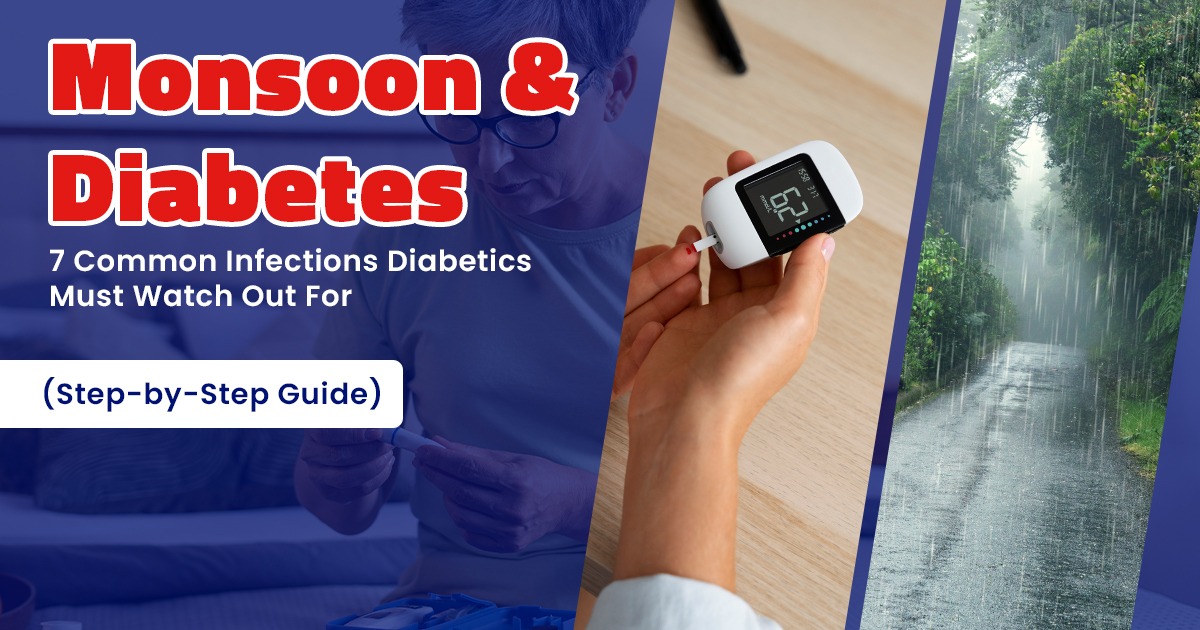
As the monsoon rains bring relief from the summer heat, they also carry with them a heightened risk of infections—especially for people living with diabetes. The increased moisture, damp environments, and sudden temperature drops during monsoon season create ideal conditions for bacterial, viral, and fungal growth. For diabetics, whose immune responses may already be compromised, this can spell trouble.
In this blog, we’ll take a closer look at why the monsoon poses a unique threat to people with diabetes and explore seven common infections to watch out for—along with tips on how to prevent them.
When blood sugar levels are consistently high, it can weaken the immune system. Diabetics often experience delayed wound healing, poor circulation, and nerve damage, all of which make them more susceptible to infections. Monsoon-related factors like walking in puddles, consuming street food, or getting caught in the rain can aggravate this risk.
Additionally, fluctuating blood sugar levels during this season—often due to changes in appetite, reduced physical activity, or missed meals during travel—can make it harder for the body to fight off infections.
What happens? Warm, moist environments encourage the growth of fungi, particularly Candida species. Diabetics are already prone to fungal infections, and during the monsoon, this risk multiplies.
Common sites:
Symptoms:
Prevention Tips:
What happens? Wet shoes and socks can cause blisters, fungal growth, and in severe cases, bacterial infections like cellulitis. For those with diabetic neuropathy, small wounds might go unnoticed and develop into serious infections.
Warning Signs:
Prevention Tips:
What happens? Humidity and temperature fluctuations can trigger respiratory problems. Diabetics are more vulnerable to severe symptoms due to compromised immunity.
Common issues:
Symptoms to Watch:
Prevention Tips:
What happens? High blood sugar creates a favorable environment for bacterial growth in the urinary tract. Monsoon dehydration or infrequent urination further adds to the risk.
Symptoms:
Prevention Tips:
What happens? Street food and contaminated water are common culprits during monsoon. Diabetics must be extra cautious as GI infections can lead to dehydration and blood sugar fluctuations.
Common issues:
Prevention Tips:
What happens? With increased viral activity during monsoon, eye infections like conjunctivitis become common. Diabetics are more prone to bacterial eye infections due to slower healing and immune response.
Symptoms:
Prevention Tips:
What happens? Increased sweat and moisture block sweat glands and hair follicles, leading to pus-filled boils. In diabetics, even small boils can turn into larger infections (carbuncles) quickly.
Symptoms:
Prevention Tips:
While monsoon is a beautiful and refreshing season, it also brings unique challenges for those living with diabetes. From fungal infections to serious foot complications, the risks are real—but they are also preventable. By staying informed, practicing good hygiene, monitoring sugar levels closely, and seeking timely medical care, you can enjoy the rains safely and healthily.
At Sre Iswarrya Diabetic Hospital, we emphasize preventive care as much as treatment. Our specialists are available to help you manage monsoon-related infections and keep your diabetes under control all year round.
Stay safe, stay dry, and stay healthy this monsoon!